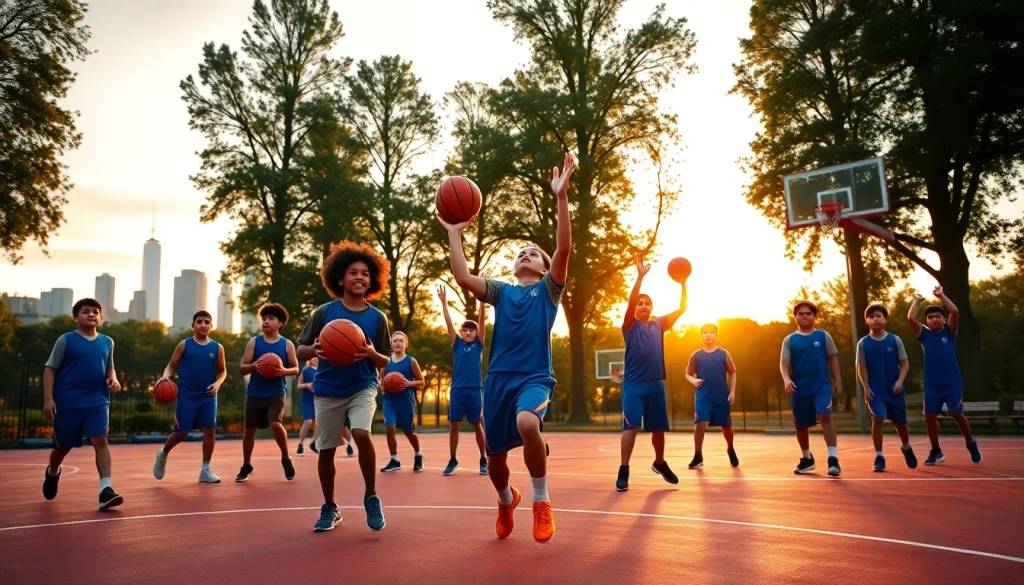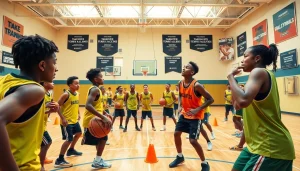Engaging Activities for Young Basketball Enthusiasts to Improve Their Game

Introduction to Young Basketball Enthusiasts
Basketball is more than just a game; it is a cultural phenomenon that inspires millions of young players across the globe. The joy of shooting a basket, the thrill of a fast break, and the camaraderie of teamwork are foundational experiences for young basketball enthusiasts. As they lace up their sneakers and step onto the court, they embark on a journey filled with passion, skill development, and life lessons. This article delves into the intricacies of nurturing young basketball enthusiasts, highlighting essential skills, training programs, and strategies to encourage a lifelong love for the game.
Understanding the Passion for Basketball
The passion for basketball often ignites at a young age. Kids watching their favorite NBA players spend hours imitating moves, shooting hoops in their driveways, and dreaming of wearing their idols’ jerseys. This enthusiasm is not simply a phase; it reflects a deeper connection to the sport that can shape their physical and emotional well-being.
For many young enthusiasts, basketball provides an escape, a platform for self-expression, and a source of inspiration. The experiences shared on the court foster friendships, boost confidence, and teach valuable life skills like discipline, teamwork, and resilience. Cultivating this passion early on is crucial for nurturing a generation of enthusiastic players who not only love the sport but also become advocates for it within their communities.
The Importance of Starting Young
Starting young has several advantages in basketball. Young players are generally more adaptable and open to learning. Introduced to the fundamentals of the game, such as dribbling, passing, and shooting, at an early age, they can develop muscle memory that will serve them well as they progress. Additionally, early engagement in structured play can help eliminate poor habits that may become ingrained over time.
Moreover, young athletes have an incredible capacity to absorb tactical knowledge. Coaches who introduce game strategies early can help players think critically about their positions, movements, and contributions to the team. This foundation enables young basketball enthusiasts to develop into skilled and strategic players capable of understanding the nuances of the game.
Current Trends Among Young Players
The landscape of youth basketball is constantly evolving. As technology advances, young players now have access to a plethora of resources that can enhance their skills. Social media platforms are filled with tutorials, drills, and highlight reels that showcase professional techniques and inspiring stories. These resources motivate young players to practice diligently and stay up-to-date with the latest basketball trends.
Additionally, there has been a significant rise in grassroots movements encouraging inclusivity in basketball. Programs catering to diverse backgrounds and skill levels are becoming more prevalent, fostering a sense of community and belonging. As young players gather in local leagues and clinics, the spirit of basketball flourishes, paving the way for personal growth both on and off the court.
Essential Skills Development Techniques
Basic Dribbling and Shooting Exercises
Fundamental skills such as dribbling and shooting serve as the building blocks for any aspiring basketball player. It is essential to establish a solid foundation in these areas before moving on to more advanced techniques.
Dribbling is not merely about getting the ball from one point to another; it requires control, speed, and awareness of surroundings. Young players should focus on the following exercises:
- Wall Dribbles: Facing a wall, players can practice dribbling the ball against it. This helps improve control and hand coordination.
- Dribble Relay Races: Players can compete in teams to dribble to a designated point and back, promoting speed and agility.
- Obstacle Dribbling: Setting up cones or other obstacles allows players to practice navigating around while maintaining control of the ball.
Shooting is another critical skill. Young players should concentrate on:
- Form Shooting: Working on the proper shooting technique close to the basket allows players to establish good habits before extending their range.
- Shooting Drills: Incorporating various shooting drills, such as spot shooting and shot variation drills, helps enhance their shooting arsenal.
- Free Throw Practice: Free throws are essential, as they often come down to critical game moments; consistent practice can improve overall shooting performance.
Advanced Techniques for Skill Enhancement
As young players become more confident in basic skills, it is vital to introduce advanced techniques to further their development.
Advanced dribbling techniques such as the crossover, behind-the-back, and hesitation moves can make players more versatile and challenging to defend. Incorporating these skills into offensive plays can help players create scoring opportunities while enhancing their overall game IQ.
Additionally, developing advanced shooting techniques like jump shots and three-pointers broadens a player’s scoring capability. Establishing a consistent routine that combines shooting mechanics with situational practice can help players achieve greater accuracy and confidence during games.
Moreover, understanding defensive techniques such as sliding, proper positioning, and anticipating opponents’ moves is equally important. Players can engage in drills that focus on footwork, defensive slides, and anticipating passing lanes to better prepare them for in-game scenarios.
Creating a Daily Practice Routine
A well-structured daily practice routine maximizes improvement and instills discipline in young players. Integrating different skill sets within a practice session keeps players engaged and helps ensure their development is well-rounded.
Young basketball enthusiasts should structure their practice routines around:
- Warm-ups and Stretching: Starting each session with proper warm-ups and stretches helps prevent injuries and prepares the body for activity.
- Skill Work: Allocating time to focus specifically on dribbling, shooting, and defense will ensure consistent growth in these key areas.
- Conditioning: Incorporating agility and strength training into practice helps build physical stamina, enhancing a player’s endurance on the court.
- Scrimmaging: Engaging in scrimmages allows players to apply learned skills in real-game scenarios, solidifying their training.
- Cool Down: Ending sessions with a cool down and reflection on performance is vital for recovery and improvement planning.
By consistently adhering to a structured practice routine, young players can experience exponential growth in their skills and overall love for the game.
Basketball Camps and Training Programs
Benefits of Attending Youth Camps
Basketball camps offer aspiring young players a unique opportunity to enhance their skills while forming bonds with peers who share their passion. These camps are designed to foster both individual improvement and teamwork, often featuring experienced coaches who provide personalized feedback and instruction.
One of the significant benefits of attending basketball camps is exposure to diverse coaching styles, which can introduce new techniques and strategies. Participation in game scenarios during camp not only develops skill sets but also boosts players’ confidence in their abilities. For instance, scrimmaging against peers can highlight individual strengths and areas needing improvement.
Moreover, camps often incorporate competitions and challenges that motivate young athletes, fostering a sense of accomplishment. Being part of a camp also builds camaraderie and friendships, emphasizing the importance of teamwork and social interaction within the sport.
Local and National Training Opportunities
In addition to summer camps, various local and national training opportunities exist for young basketball enthusiasts. Many community centers, sport clubs, and schools offer dedicated basketball programs focusing on skill development and gameplay tactics.
Participating in local leagues or organized teams helps players not only improve their skills but also understand the value of commitment and collaboration in a team setting. National programs, such as those run by well-known organizations like NBA Cares, often provide elite training sessions and tournaments that can lead to scholarships and further opportunities in the sport.
As more emphasis is placed on early specialization in certain sports, becoming familiar with various training options allows players to discover their niche within basketball. Players should explore avenues that align with their specific interests, whether competing at the recreational or elite level.
How to Choose the Right Camp
Choosing the right basketball camp is crucial for maximizing development and enjoyment for young players. Factors to consider include:
- Location: Proximity to home can impact attendance and overall experience, especially for longer camps.
- Coaching Staff: Researching the background and experience of coaches involved can help determine the camp’s quality and credibility.
- Curriculum Focus: Ensuring the camp offers training and skills lessons that align with the player’s specific areas of interest.
- Reviews and Recommendations: Seeking feedback from previous attendees can provide insight into the camp’s quality and effectiveness.
By considering these aspects, parents and players can make informed decisions, ensuring a positive and impactful camp experience for young basketball enthusiasts.
Understanding Game Strategies for Young Players
Basic Offensive and Defensive Tactics
Understanding game strategies is vital for the development of young basketball players. Basic offensive tactics involve spreading the floor, effective ball movement, and creating space for teammates. Young players should learn about:
- Spacing: Properly positioning themselves on the court helps create driving lanes and passing opportunities.
- Pick and Roll: This offensive play allows players to create mismatches and open shots for themselves or teammates.
- Fast Breaks: Learning to transition quickly from defense to offense can exploit the opponent’s unpreparedness.
On the defensive end, understanding how to guard an opponent effectively is crucial. Basic defensive tactics include:
- Staying Low: Maintaining a lower center of gravity while guarding opponents promotes quicker movements.
- Communication: Calling out screens, switches, and positions fosters better team defense and helps build trust among players.
- Knowing the Rules: Familiarizing with fouls allows players to avoid unnecessary penalties that could impact game flow.
Teamwork and Communication Skills
Basketball is a team sport, and developing teamwork and communication skills is imperative for young players. Coaches should emphasize the value of working together to achieve common goals, encouraging players to support and uplift one another.
Regular practice sessions and scrimmages provide outstanding opportunities to hone communication skills on the court. Initiating conversations during plays, providing constructive feedback to teammates, and celebrating victories together contribute to the team’s overall success.
Additionally, incorporating team-building activities both on and off the court can strengthen players’ relationships. Players bond through shared experiences, building trust and a sense of belonging that will translate positively during competitions.
Analyzing Game Plays for Improvement
Analysis is a critical component of basketball understanding. Coaches should encourage young players to review game footage and discuss plays, highlighting both successful and unsuccessful maneuvers. This process allows players to learn from their mistakes and build confidence in their abilities.
Young athletes can benefit from keeping a journal in which they document their experiences, including goals achieved, areas for improvement, and lessons learned after each game. By reflecting on their performance, players can set measurable objectives for their next outing and track their growth over time.
Encouraging a Life-Long Love for Basketball
The Role of Parents and Coaches
Parents and coaches play a pivotal role in nurturing a lifelong love for basketball among young players. Their involvement should be supportive yet non-intrusive, allowing young athletes to enjoy the game without undue pressure.
Encouraging young players to explore different aspects of basketball fosters a well-rounded appreciation for the sport. For example, parents can involve their children in community basketball events, games, or meet-and-greet sessions with professional players, creating lasting memories that deepen their love for the game.
Coaches should also focus on creating an inclusive, positive environment that celebrates successes and acknowledges failures. By fostering a spirit of resilience and perseverance in young athletes, they can help cultivate a lifelong passion for basketball.
Incorporating Fun into Basketball Practices
While skill development is essential, infusing fun into basketball practices is equally crucial for maintaining motivation and enthusiasm. Creative drills, themed practices, and challenging games can transform routine sessions into enjoyable experiences.
Introducing friendly competitions and rewards for achieving specific targets can create a dynamic atmosphere that encourages playful engagement. For instance, incorporating shooting contests with team-based scores or offering fun challenges can ignite friendly rivalry and spur improvement.
Building Community Through Basketball
Community is at the heart of basketball culture. Fostering connections among local players, families, and clubs can create a supportive environment that extends beyond the court. Encouraging young players to participate in local leagues or community service initiatives promotes a sense of belonging and responsibility.
Moreover, community gatherings organized around basketball, such as skill clinics or charity tournaments, can strengthen relationships among young athletes and foster a deeper appreciation for the sport. By actively engaging within the basketball community, young players develop friendships that further enhance their love and commitment to the game.







